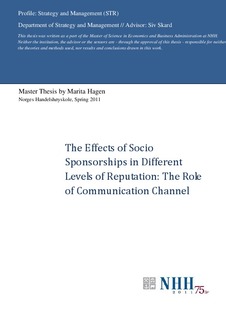| dc.description.abstract | By en engaging in socio sponsorships, companies can not only generate favorable consumer
attitudes and enhance purchase intention, but in a long term perspective, they can build
company image and strong stakeholder relationships. However, consumers’ low awareness of
and critical attributions towards the sponsorship activity still remain impediment in
companies’ attempt to benefit from the sponsorship, emphasizing a need for companies to
communicate sponsorship more effectively to consumers. In order to fill a gap in sponsorship
literature, this thesis examines how the choice of message channel might enhance trust and
purchase intentions for low and high reputation sponsors in socio sponsorship, and whether
the effects are mediated by persuasion knowledge, sincerity and fit.
The findings indicated that low reputation companies are better off communicating with
advertisement, whilst high reputation companies proved to create more favorable consumer
outcomes with PR. Socio sponsors want to balance commercial and altruistic motives because
the support of a good cause might trigger skepticism make extrinsic motives more salient. As
low reputation companies are perceived as less sincere, communication through third party
sources might create a contrast effect that increases suspicion and perception of dishonest
intentions. As such, low reputation companies are better off communicating through
advertisement that is more transparent and direct in its form. Sponsors with a high brand
reputation, however, will generate higher consumer outcomes by using third party
communication. Consequently, sponsors ought to communicate through PR, historically
known for generating sponsor trust and credibility (e.g. Ries & Ries; Yoon et al 2006).
Moreover the study showed that a high reputation will have a positive effect on consumer’s
perception of sponsorship congruency. The findings are similar to what Roy & Cornwell
(2004) found in their study on event sponsorships. | en |
